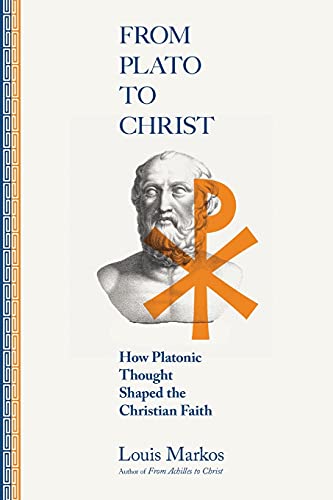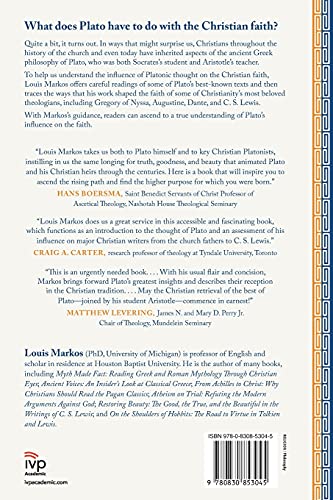


From Plato to Christ: How Platonic Thought Shaped the Christian Faith
R**C
Very well written and worth investing
Authors made understanding Plato’s philosophical concepts palatable to understanding and how it connects to some level of Christian principles and thought. I humbly can say I would suggest it’s a well worth book to invest being it is a bit pricey but worth it.
D**
Interesting and Engaging
This is a very engaging and thought-provoking book. The text is relatively short and gives plenty of food for thought for further reading.
J**N
Clear, Concise, and Bold
Loved this new book by Louis Markos! I highly recommend it. It is one of the clearest accounts of Plato I've read, and Markos shows how the early church found inspiration in Plato. I particularly liked his chapter on C.S. Lewis. If I could give it six stars, I would!
J**W
Valuable introduction to Plato's dialogues.
The more I learn of thought traditions on important subjects like truth, justice, and purpose, the more their interconnections become apparent. The better I understand one, the better I understand the others. Louis Markos does a superb job of connecting the dots in ways that make me anxious to learn still more.
N**E
A concise account of historical relation between the Antiquity and Christian thought.
I was given a clear picture of the subject but it seemed to me th interpretation was not digging deep enough.
…**…
Immature & Incompetent
Markos can’t give a biblically informed critique of Plato, much less Plato’s influence on the church, because he erroneously reads so much of Plato into the Bible.
D**E
INTERVIEW WITH THE AUTHOR
Moore: You have written many books. What, perhaps who (!), propelled you to write this book at this time?Markos: Several years back, I published a book, also with InterVarsity Press, called From Achilles to Christ: Why Christians Should Read the Pagan Classics. In that book, I looked closely at the Iliad, the Odyssey, the Greek tragedies, and the Aeneid. In the preface to the book, I confessed that I also should have covered Plato, but that Plato really deserved his own book. After over a decade, I finally had the chance to write From Plato to Christ and explore how Plato could be analyzed both in terms of his own thought and in the many ways that his thought points forward to the greater revelation of Christ and the New Testament.Moore: How big an impact did Socrates have on Plato in helping the latter develop his own understanding of reality?Markos: Socrates prepared the way for Plato in three ways. First, he invented true philosophy by joining together metaphysics and ethics. Second, he did the hard work of exposing and erasing false definitions of things like goodness, truth, beauty, courage, and justice. Third, he moved in the direction of establishing universal, absolute definitions for these things that would be true for all times and places. However, he only laid the groundwork for the third; it was left to Plato to finish what his teacher had started.Moore: I believe the first thing I read of Plato’s was the Symposium. What would you suggest as the best starting point for those with little familiarity of Plato’s body of work?Markos: I would begin with the Apology. In that great “court transcript,” Socrates defends his life and his philosophical mission before the radical democracy of Athens. In it, he lays out his method of seeking truth through question and answer and maintaining humility in that search. After that, I would read Symposium, Phaedrus, Gorgias, and Phaedo. By then, readers will be ready for Republic.Moore: I’m sure you have heard the following objection many times: Why are you spending so much time trumpeting the importance of some pagan thinker?Markos: All Christians believe that Jesus fulfilled the Old Testament law and prophets. I would argue that he also fulfilled the highest yearnings and greatest desires of the pagans. By studying Plato, I get a glimpse into the way God prepared the pagan world for the coming of Christ by working through thinkers like Plato who did not even know they were being used! Paul confirms this element of preparation when, in his speech before the Areopagus in Athens (Acts 17), he quotes two verses of poetry from two ancient Greek pagan poets.Moore: In light of the previous question, I will say that Plato’s view of sexuality has made me struggle a bit with how much to listen to him. I very much appreciate that we are to “plunder the Egyptians” or remember that “all truth is God’s truth.” That said, how do you encourage fellow Christians to not dismiss Plato due to the perversity of some of his views?Markos: Although Plato did not advocate homosexual behavior (“Platonic love,” as we still call it today, was non-sexual), he did allow for homoerotic connections between an older man and a younger man that he was molding and guiding. Still, we must remember that the pagans, lacking Genesis, lacked an incarnational view of man (that we are not souls trapped in bodies but enfleshed souls) and of marriage and sexuality (the two shall be one flesh). The lack of special revelation left Plato and the other pagans ignorant of vital things, but Plato did make full use of the general revelation he received through creation, conscience, and reason.Moore: Most of us like to make our arguments very quickly. We tend to move from A to Z at a brisk pace rather than making our points incrementally.You mention that in seeking to correct Thrasymachus, Plato does not do so “with a full refutation…” What can we learn from this kind of patient approach to argumentation?Markos: I am so glad that Christian apologists speak today of worldview and how it affects all of our beliefs and behaviors. We need that slow and patient approach that Plato took if we are to uncover the assumptions and presuppositions that drive people’s philosophies and actions. We need to ask big, foundational questions about the nature of God, man, and the universe before we can tackle the specific problems that we face every day. Our age is particularly deficient in logic, the foundations of which were laid down by Plato’s greatest pupil, Aristotle. Do I need to write a book someday called From Aristotle to Christ??Moore: What are two or three things you hope your readers gain by reading this book?Markos: First, I want readers to see that although God only spoke directly to the Jews before the coming of Christ, he did not simply ignore the rest of humanity. The reason and desire that God gave us can take us quite far, though it certainly cannot save us from our sins. Second, I want people to see the joy of asking the big questions in life and wrestling with those questions. Third, I want people living today in a relativistic and radically egalitarian society to understand that absolute goodness, truth, beauty, and justice exist, and that distinction and hierarchy are good, God-created things. We were not made to all be the same!
S**N
PRODOUND INSIGHTS INTO A SUBJECT THAT IS NOT ONLY NEGLECTED BUT UNRECOGNZIED
REVIEW OF FROM PLATO TO CHRIST (How Platonic Thought Shaped the Christian Faith) By Louis Markos; InterVarsity Press; 2021; 231pp; pbThe past 20 years or so have seen a renewed interest in the way of thinking (epistemology) of the earlychurch and the medieval and Reformation church also. Called “classical theology” it held sway until themid 19th century when the seeds of the so-called “Enlightenment” bore poisonous fruit in reshaping howGod and Christianity were conceived. “Classical theology” emphasized the doctrine of God and “metaphysics”. God is in a class of His own, sui generis. Increasingly in the late 20th and early 21st century theologians have recognized this downsizing of God since the 19th century and sought to redress the errors of the past 150 years. Those who have labored to regain lost treasures of the past include John Webster, Richard Muller, Hans Boersma, Fred Sanders, Scott Swain, Michael Allen, Richard Barcellos, James Dolezal, Matthew Barrett, Craig Carter, Stephen Duby, Matthew Levering and a host of others.Professor Louis Markos has entered the lists and contributed his own insightful study (FROM PLATO TO CHRIST) showing how the thought patterns of the first Christians and the early church were indebted to the epistemological clarity worked out by some early Greek philosophers, especially Plato.At the beginning of chapter 12, Markos tells us concisely why the epistemological insights of the earlyChurch and Platonic underpinning must be recaptured by showing us what has happened in its absence.“The Modern World with its naturalism, its utilitarianism and its deep skepticism, has not proven to be a breeding ground for disciples of Plato, whether Christian or secular: (Jeremy) Bentham and (John Stuart) Mill, (Charles) Darwin and (Sigmund) Freud, (Frederich) Nietzsche and (Karl) Marx, (Jean Paul) Sartre and (Jean Jacque) Derrida have so relativized Goodness, Truth and Beauty as to cut western man off, not only from Platonic Forms, but from any transcendent origin or source or cause. Worse yet, in the absence of a Divine standard or touchstone, not to mention a personal Creator, the goal of ascending the rising path toward the Beatific Vision loses not only its desirability but its possibility as well. Without a real, actual telos (ultimate end or goal) to love and to pursue, the ascent can only turn back on itself, fostering ego rather than awe, self-satisfaction rather than gratitude, stoic equanimity rather than life-giving joy.” (FROM PLATO TO CHRIST; p. 202)Professor Markos begins his work by showing the epistemological struggles of the fallen Greek thinkers priorprior to the coming of Christ and the New Testament revelation.PART I—PLATO’S PRE-CHRISTIAN VISION1. Socrates, the Sophists, and the Pre-Socratics2. The Republic3. The Myths: Part I4. The Myths: Part II5. Laws6. TimaeusPART II—PLATO’S CHRISTIAN LEGACY7. The Rising Path8. Origen’s Musings9. Plato in the East: the Three Gregorys10. Plato in the West: Augustine, Boethius and Dante11. From Renaissance to Romanticism: Erasmus, Descartes and Coleridge12. C. S. Lewis’ Christian PlatonismConclusion: Plato the sub-creatorBibliographical EssayThe reader is warned to be careful because this book (along with some of works by authors mentionedAbove) might just blow your mind wide open.Thank you InterVarsity Press for publishing this most helpful study.Steve Martin10 years a worker with students in Indiana, California and Georgia31 years a pastor in AtlantaRetired Dean of Students; IRBS Seminary in Texas
Trustpilot
1 month ago
1 week ago